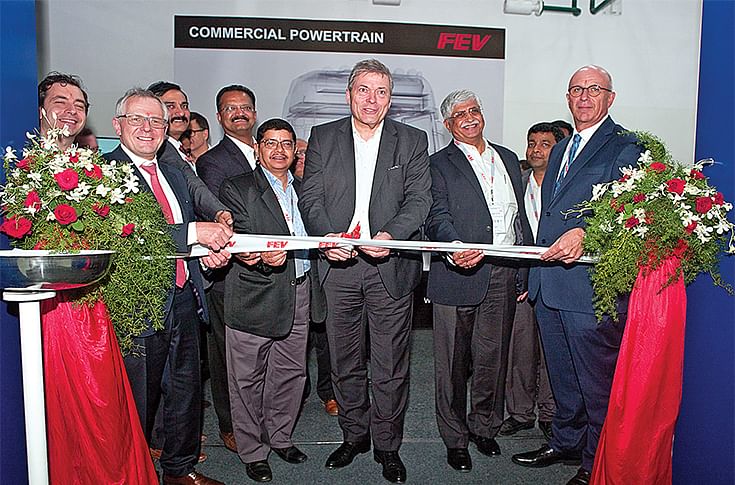Prof. Dr. Stefan Pischinger: ‘FEV’s new Pune facility can be expanded for more engine test benches and lots more’
FEV inaugurated its new mobility centre in Pune, which houses BS VI powertrain test benches among a host of facilities
On April 30, FEV India inaugurated its new mobility centre in Pune, which houses BS VI powertrain test benches among a host of facilities. The President and CEO of the FEV Group spoke to Autocar Professional on the disruptions in industry, BS-VI, electrification and customer demand in India.
Can you tell us more about the developments in India in the past few years that prompted you to invest in new facilities and the new powertrain testbed in Pune?
We have been locally present in Pune for over 10 years now with our engineering team and facilities. In the past few years, we have heard from our interaction with industry stakeholders and OEMs about the disruptive changes. We too have seen the disruptive changes not only on the engine and powertrain side, resulting from the emission legislation and tighter fuel consumption requirements, but also in electrification and new fuels. And this calls for much more engineering work becoming necessary.
India is a very cost-sensitive market. When it comes to development costs, customer expectations are to achieve what's possible at the lowest possible cost. Is this different than the set of customer experiences in the European market?
I think innovation always means making a complete package that satisfies the market. So, you have to find a targeted solution for the money that somebody is willing to pay for a product. In addition, you also have to meet the requirement of reliability, fuel consumption and NVH. That is why we also have an NVH test bench in India.
Indian customers have very high demands, which means you need to have cost-effective solutions. You have to be cost-effective in development and in production, which creates new ideas and makes new ideas necessary. That's what we are doing here.
For a company like FEV, disruptions mean new business. India Auto Inc is leapfrogging from BS-IV to BS-VI, which is turning out to be a challenge for OEMs and suppliers. As an engineering company specialising in powertrain, how do you view this generational technology leap?
We have had discussions with our customers about leapfrogging. It’s clear that for reliable development and the shift from BS-IV to BS-VI, a certain time span is needed. You need to have an engine concept. When we (FEV) do a design engine concept, we also always make it ready for the next generation and for the next emission standards. However, it cannot be done within a year for manufacturers who don't have everything ready for it yet. That's our challenge and we are facing it. I would like to say disruption is a chance (for FEV), but you have to also manage it.
 L-R: Dr Tamer Gocmez, vice-president, FEV Asia; Prof. Dr. Stefan Pischinger, president and CEO of the FEV Group; Sushil Berry, MD, FEV India; Rajendra Petkar, chief technology officer, Tata Motors; Guenter Butschek, CEO, Tata Motors; RR Deshpande, CEO and MD, Kirloskar Engine Oils; Vijay Sharma, Technical Director, FEV India and Dr Jurgen Morhard, Consul General, Germany, at the opening of the new mobility centre.
L-R: Dr Tamer Gocmez, vice-president, FEV Asia; Prof. Dr. Stefan Pischinger, president and CEO of the FEV Group; Sushil Berry, MD, FEV India; Rajendra Petkar, chief technology officer, Tata Motors; Guenter Butschek, CEO, Tata Motors; RR Deshpande, CEO and MD, Kirloskar Engine Oils; Vijay Sharma, Technical Director, FEV India and Dr Jurgen Morhard, Consul General, Germany, at the opening of the new mobility centre.
Disruption can also be a risk because you have a lot of investment in facilities for engines. If suddenly engines would not be needed anymore, that could be a challenge for FEV as well. But we don't see that right now. What we see is combustion engine development, from BS-IV to BS-VI and beyond as well along with new electrified vehicles — hybrids and battery electric vehicles.
Do you foresee a future of more electric and hybrid vehicles in India? When do you probably see this disruption impacting the market and higher adoption of electrified vehicles in India?
We know that everywhere in the world, electrification is pushed by legislation and the government. It strongly depends on the details of the legislation. If the legislation as in FAME II now was first targeted towards fleets, you will not see so many production numbers. But when that legislation also hits private vehicle buyers, you will see much larger numbers.
I believe worldwide, there will be a legislative pressure on electrified vehicles, and then that market will increase but it also needs infrastructure. Everything has to be targeted at the same time, only then can it work.
Are there any more plans for expansion in India and new investment?
The new facility in Pune is big enough to expand for more test benches, not only engine but also test benches for electric machines, transmission, electric drives, powertrain and batteries. So, I am sure that there will be more expansion which will happen in the future.
(This interview was first published in the June 15, 2019, issue of Autocar Professional)
RELATED ARTICLES
INTERVIEW: "EV Demand is Rebounding both in India and Around the Globe" - JLR's Rajan Amba
Jaguar Land Rover India MD Rajan Amba discusses the India–UK FTA, the company’s manufacturing plans, the upcoming Panapa...
TVS Celebrates 20 Years of Apache, Eyes Premium and Global Push
Marking two decades of its flagship performance brand, TVS Motor unveiled special anniversary editions on Saturday while...
Q&A: Mahindra's Nalinikanth Gollagunta on Upcoming Festive Season, 'Bold' Design Choices
Automotive Division CEO Nalinikanth Gollagunta says mid-teens growth is achievable with Roxx ramp-up, BEVs, and a resil...






 24 Aug 2019
24 Aug 2019
 35135 Views
35135 Views





 Prerna Lidhoo
Prerna Lidhoo


 Darshan Nakhwa
Darshan Nakhwa


